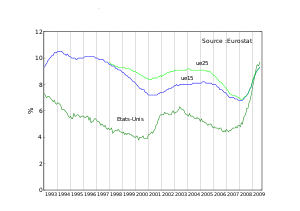
For almost two years, Nicki Edwards has been looking for work — any type of work.
She is 19 years old, well-spoken and self-possessed. But like many young people in Britain, she could not afford to remain at her university, making it impossible to find a job. London’s youth riots last summer have closed even more doors to people like her.
“If you are not working, in training or in college, you might as well be a thief — employers just do not take you seriously,” Ms. Edwards said. “At some point, you just say, ‘I’m stuck and I will never find a job.’ ”
Perhaps the most debilitating consequence of the euro zone’s economic downturn and its debt-driven austerity crusade has been the soaring rate of youth unemployment. Spain’s jobless rate for people ages 16 to 24 is approaching 50 percent. Greece’s is 48 percent, and Portugal’s and Italy’s, 30 percent. Here in Britain, the rate is 22.3 percent, the highest since such data began being collected in 1992. (The comparable rate for Americans is 18 percent.)
The lack of opportunity is feeding a mounting alienation and anger among young people across Europe — animus that threatens to poison the aspirations of a generation and has already served as a wellspring for a number of violent protests in European cities from Athens to London. And new economic data on Wednesday, showing much of Europe in the doldrums or recession, does little to bolster hopes for a better jobs picture anytime soon.
Experts say that the majority of those who took to the streets in London last summer were young people who were unemployed, out of school and not participating in a job training program.
Classified by statisticians as NEETs (not in education, employment or training), they number about 1.3 million, or one of every five 16-to-24-year-olds in the country.
While youth unemployment has long been a chronic issue here, experts say the British government’s debt-reduction commitment to rein in social spending appears to be making the problem worse, experts say. Insufficient job training and apprenticeship programs, they argue, contribute to the large pool of permanently unemployed young people in Britain.
“It is patently wrong for young people to have such a poor start in life, when there is so much more we could be doing,” said Hilary Steedman, an economist at the London School of Economics. “Just because they did not go to university does not mean they don’t want to work.”
Many young people here spend endless months applying for technical jobs for which they do not have adequate training. In many cases, months turn into years, with people remaining on the dole indefinitely. In the most recent fiscal year, the government paid £4.2 billion ($6.6 billion) in benefits to this age group, at least some of which might be better spent on job training, some experts argue.
Read more . . .
Bookmark this page for “multiple sclerosis” and check back regularly as these articles update on a very frequent basis. The view is set to “news”. Try clicking on “video” and “2” for more articles.








